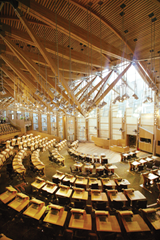Scottish independence and Northern Ireland
Independence for Scotland would have a major impact on Northern Ireland’s politics. Peter Cheney sums up the debate and the way ahead.
Scots will face a decisive choice between independence and the union in the next four years, with each option carrying major consequences for Northern Ireland’s future.
Independence would leave the province as an isolated western edge of the UK. Alternatively, a continued union is likely to be looser with Westminster passing more power to Edinburgh, setting a precedent for more power to Stormont.
The UK was formed by two unions: Scotland with England and Wales (1707), and Great Britain with Ireland (1801). Scotland is home to 8.4 per cent of the UK’s population (5.2 million).
As a priority, Alex Salmond wants the UK Government to give Holyrood three extra responsibilities through its Scotland Bill:
• additional borrowing powers;
• corporation tax; and
• the offshore Crown Estate.
He expects more progress on borrowing but there “seemed to be an element of hesitation” on corporation tax. UK ministers consider Northern Ireland a special case due to the land border with the Republic.
At present, the Bill promises to implement the 2009 Calman Commission report. This was commissioned by the main unionist parties (Labour, Conservatives and Lib Dems) to make devolution more flexible.
The largest transfer of fiscal power away from London in the UK’s history would allow Scotland to set a specific Scottish income tax (to replace part of UK income tax) and borrow up to £2.2 billion for capital projects.
These changes are to be phased in from 2013 and would increase the locally- raised share of Scotland’s budget from 15 per cent to 35 per cent. Westminster is reluctant to abolish the Barnett formula as it tackles the UK’s deficit but the debate will gradually return.
Downing Street has said that any “changes or expansions” in the Scotland Bill must be in the “in the best interests of the whole of the UK.”
Options
In practice, independence would give Scotland sovereignty over all policy, including its finances, security and diplomacy. This is outlined in detail in the Scottish Government’s November 2009 white paper ‘Your Scotland, Your Voice: A National Conversation’.
Scottish citizens with English, Welsh or Northern Irish ancestry could be offered shared or dual citizenship. The UK’s nuclear deterrent, currently based on the Clyde, would be relocated and the SNP would leave NATO.
Alex Salmond, though, is no revolutionary. Scotland would keep:
• the British monarch as its head of state;
• the pound sterling as its currency (unless a referendum decided otherwise);
• free movement within the British Isles (the Common Travel Area); and
• EU and Commonwealth membership.
All parts of the British Isles would still co- operate through the British-Irish Council.
However, an independent Scotland will have to pay its own way. The SNP foresees a sovereign wealth fund to ‘bank’ revenue from North Sea oil and gas and invest these for future generations. Norway’s oil fund was worth 3,077 billion kroner (£342 billion) on 31 December 2010. Total public spending in Scotland was £48.6 billion in 2008-2009.
The SNP has also put forward full devolution within the UK, partly to win over Scottish unionists but also as a stepping stone to independence.
Westminster would still decide monetary policy, defence and foreign affairs. Scotland could have its own civil service and social security system, just like Northern Ireland, and a Scottish chamber in the UK Supreme Court.
Crucially, full devolution would include fiscal autonomy i.e. raising money for Scottish public services inside Scotland (including from North Sea oil money). This means more autonomy than the Scotland Bill would allow and could bring about a federal union, similar to Australia, Canada or the USA.
With Scotland gone, Northern Ireland would be surrounded by two independent states with the rest of the UK no longer visible across the Irish Sea. This could leave unionists uneasy, especially those with Scottish ancestry, and boost nationalism. Sinn Féin and the SDLP both want to see a border poll by 2015.
Northern Ireland’s share of UK population would rise marginally from 2.9 per cent to 3.2 per cent.
Peter Robinson is concerned by the SNP’s performance. “I think clearly as a unionist there would be concerns that a nationalist party is getting that level of support,” he told agendaNi. “And I just hope that there’s no correlation between support for them to be the Government of Scotland and their policy of annexing that part of the United Kingdom.”
Gerry Adams has said the SNP could bring the UK “to a head” and added: “It is part of the provision of the Good Friday Agreement to have a referendum on Irish unity.”
Union
In the union’s defence, Gordon Brown and Douglas Alexander wrote ‘Stronger Together: The 21st century case for Scotland and Britain’ to mark its 300th anniversary. Many of its points have been made by David Cameron.
Shared history, values and language are seen as the union’s main ties. The welfare state serves the whole of the UK and families cross its internal boundaries. Scotland has 400,000 English residents while 800,000 Scots live in England. At a more local level, 17,000 Scots live in Northern Ireland and 33,000 people from here live in Scotland.
Historically, Scotland has benefitted from the UK’s “powerful international voice”. England is its largest export market and Scottish banks are closely linked to the City of London.
Opinion polls on independence and the union often fluctuate. Support for independence currently stands around 30 per cent but the SNP won a 45.4 per cent vote share in the May election.
The stakes are high for both the party and its opponents. Budget cuts (£1.3 billion in 2011-2012) will prove unpopular and Alex Salmond will only hold the poll later in the Scottish Parliament’s term, when an economic recovery could help his case.
David Cameron, meanwhile, does not want to be remembered as the current UK’s last Prime Minister.







